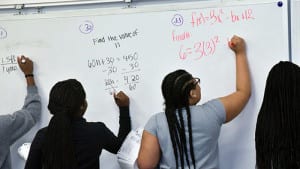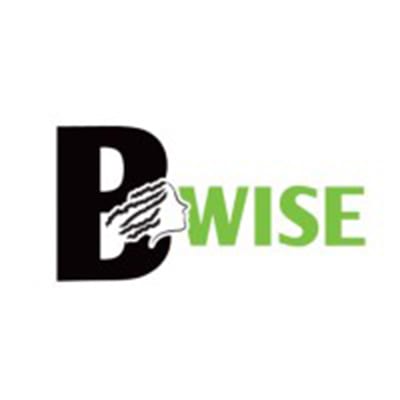The Future Is Bright for Black Math and Statistic Majors

Math and statistics majors are natural problem solvers. Their studies encompass algebra, calculus, geometry, and various equations essential for tackling complex challenges. Beyond mastering these concepts, they develop critical thinking skills that enable them to apply mathematical principles to more extensive, real-world problems.
Renowned mathematician and HBCU alumna Katherine Johnson once said, “We will always have STEM with us… There will always be science, engineering, and technology. And there will always, always be mathematics.” Her words underscore the enduring relevance of mathematics, ensuring that math-related careers will never become obsolete.
Depending on where you study, you may major in mathematics, statistics, or applied mathematics. One way to describe the difference between general and applied mathematics is that applied mathematics involves math put to practical use, such as in the film Hidden Figures, while pure mathematics is more theoretical — what you might see in films such as Good Will Hunting or A Beautiful Mind.

Spelman College
The Need for More Black Americans in Math and STEM Fields
The underrepresentation of Black students in STEM (science, technology, engineering, and mathematics) fields, particularly in mathematics, remains a significant concern. Recent data from MAA revealed that Black students earned approximately 4% of bachelor’s degrees in mathematics and statistics, a decline from 8.5% in 1997–98.
This trend highlights the need for targeted interventions to promote Black students and professionals within STEM disciplines.
Current Challenges
The consequences of inequitable STEM access begin as early as grade school. Communities with the resources to host STEM programs and activities are frequently in well-off areas, which skew disproportionately White. Similarly, families who can afford expensive, advanced science and mathematics experiences for their children start with a leg up in future pursuits and expose kids to STEM role models early.
Conversely, underrepresented groups tend to live in lower-income communities — often due to systemic and generational income inequities — where math and STEM enrichment opportunities are either less available or less accessible. These issues lead to and are compounded by further causes of the STEM gap:
- Institutional barriers result in fewer role models. As of 2019, Black mathematicians account for only 13 of the roughly 2,000 tenured faculty members in the top 50 U.S. mathematics departments. This underrepresentation means that many college students lack access to role models who can effectively encourage them to pursue and complete mathematics degree programs.
- Microaggressions and implicit bias. Black mathematicians — to say nothing of young Black students with a talent for mathematics — frequently encounter subtle forms of discrimination and prejudice that make academic environments unwelcoming.
- Policy limitations. The decline of specific programs and policies considering race in admissions, recruitment, and retention in higher education has contributed to the decreasing number of Black students in math and STEM programs.
Why Representation Matters
More African American students must get the encouragement and resources they need to drive proportional racial representation in mathematics fields. This is true for many important reasons, including the following:
- Diversity of thought. A racially and culturally rich workforce of mathematicians brings various perspectives to problem-solving, enriching related fields with innovative solutions.
- Social equity. Increasing the number of Black math majors can help address systemic inequalities that have historically marginalized Black communities in academia.
- Economic benefits. Because many STEM careers can be significantly more lucrative than those in other disciplines, getting a mathematics degree is an excellent foundation for the upward economic mobility of Black Americans. In addition, a more diverse workforce can better tackle the challenges of a global economy and create opportunities for historically underrepresented communities to access well-paying STEM jobs.
- Role models. More Black professors in mathematics can inspire and mentor younger Black students considering a career in STEM.
In short, increasing the number of Black math majors is not just a matter of social justice; it’s a necessity for advancing the field. Universities, policymakers, and communities must collaborate to break down Black students’ barriers in pursuing mathematics at the collegiate level.
HBCUs Can Help You Start a Career in Mathematics
Given the recent Supreme Court ruling on affirmative action in college admissions, more Black students will likely turn to historically Black colleges and universities (HBCUs) for their education. These institutions will do everything they can to meet increased student demand. HBCUs help more students earn college degrees — including those in STEM majors — and compete successfully for well-paying jobs in competitive careers. Today, 25% of African American graduates with STEM degrees come from HBCUs, which helps to improve workforce diversity and increase upward economic mobility.
People of all ages, races, and life paths can help improve diversity in American mathematics by supporting scholarships and other forms of funding for HBCUs with related programs. By donating today, you can make a difference in the lives of mathematics students in one easy step.
Careers for Math and Statistics Majors
Students with a degree in math or statistics can work in various careers and industries. Their skills and knowledge enable them to work in industries ranging from computer science to finance to biotech. The list of options is extensive and includes:
- Accountant
- Actuary
- Analyst
- Auditor
- Architect
- Biomathematician
- Cryptographer
- Engineer
- Environmental Mathematician
- Mathematical Scientist or Research Analyst
- Numerical Analyst
- Operations Research Analyst
- Topologist
Whatever your interest, students who plan to pursue careers in this field will need to enroll in a bachelor’s degree program in math or statistics. Such programs include a wide range of related course subjects, such as:
- Foundations of math
- Differential equations
- Calculus
- Number theory
- Complex variables
- Linear algebra
- Math structure for computer science
- Modern geometry
- Mathematical statistics
- Probability and statistics
- Real analysis
Want to learn more about math or statistics? Have questions about which UNCF colleges and universities offer these programs? Looking for help with financing this degree?
Click Here So We Can Help You!
Preparing for Success
Good candidates for math or statistics majors are students who enjoyed and performed well in high school math classes. Because mathematics is a fairly broad field, with topics ranging from trigonometry to number theory, students should have an affinity for the breadth of the major or an interest in its many forms.

UNCF Schools to Consider
These highly ranked UNCF-member schools (and more) offer programs for students wishing to work in the field of math and statistics:
- Tuskegee University
- Spelman College
- Clark Atlanta University
- Xavier University of Louisiana
- Claflin University
- Virginia Union University
- Florida Memorial University
- Oakwood University
- Rust College
- Bethune-Cookman University
- Tougaloo College
Professional Organizations
Many organizations in various fields of mathematics and statistics can offer more insight into working in those fields. A sample list includes:

- Black Women in Science & Engineering (BWISE)
- National Association of Black Accountants (NABA)
- American Statistical Association (ASA)
- American Mathematical Society (AMS)
- Association for Women in Mathematics (AWM)
- Institute of Mathematical Statistics (IMS)
- Mathematical Association of America (MAA)
- National Council of Teachers of Mathematics (NCTM)
- TODOS: Mathematics for All (TODOS)
Scholarships Available
There’s no better way to start your path toward a successful career as a mathematician than with a solid financial foundation. Fortunately, many scholarships are available through UNCF, including some specifically for math majors. Keep an eye on the UNCF website for current scholarship opportunities and announcements.
You can search for specific scholarships and view those currently accepting applications here! Students should also check with each college or university to see if additional scholarships are available for studying math.
As you explore your options, use our guide to apply for scholarships and grants. You can also receive guidance by submitting a major interest form if you are interested in a career in math. Submit the form on our website to get started. And follow us on UNCF social media channels to receive notifications about our scholarships and member HBCUs. Reach out today!
You can also support students pursuing careers and furthering equity in math and statistics by contributing to UNCF member schools. Education is the greatest tool we have in creating a just and equitable society where economic mobility is available to all. Help us achieve this future by donating today!